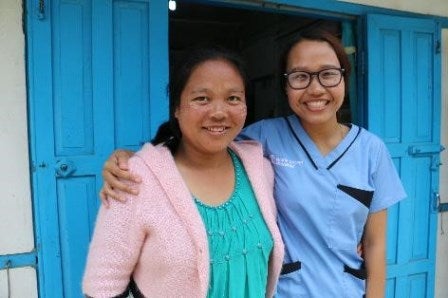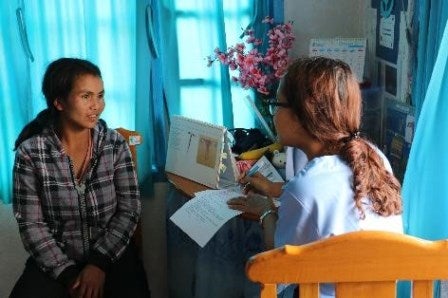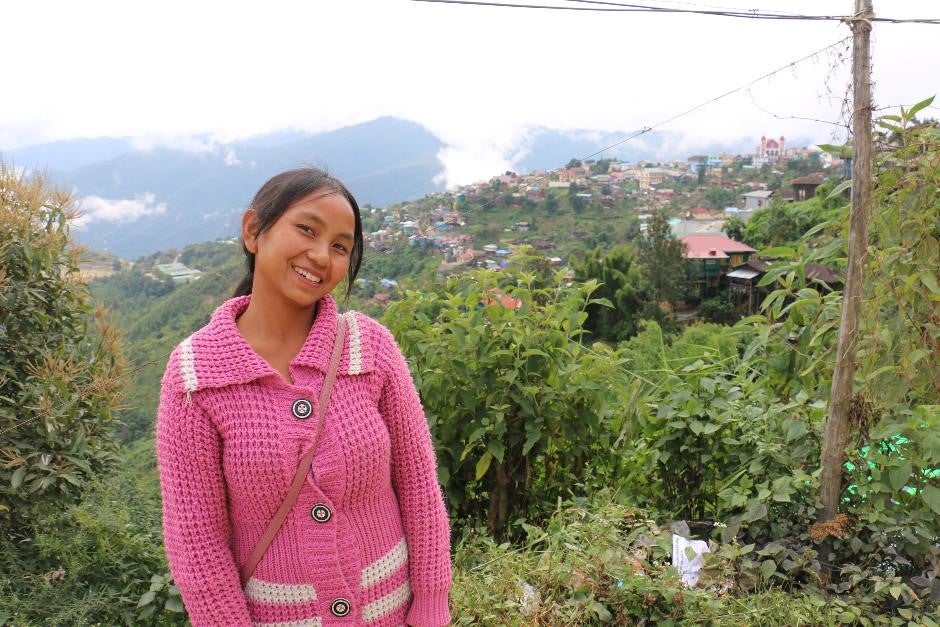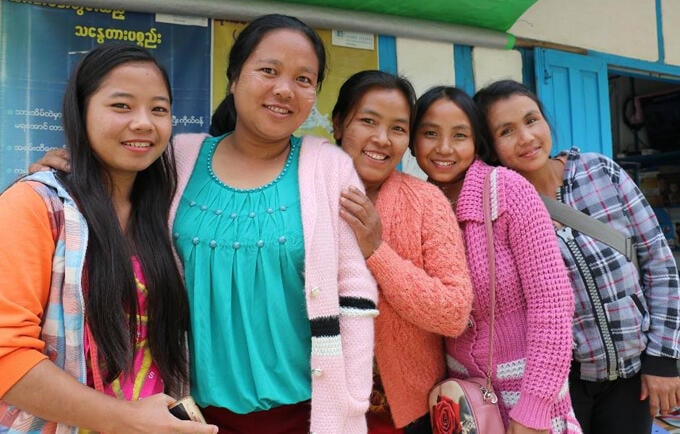One day, a nurse arrived in the isolated village of Ramthlo in Myanmar’s Chin State. She spoke to the women in the village about family planning, and told them that they could decide for themselves how many children to have, and when to have them. She explained that in the closest town, Falam, there was a clinic where they could get individual advice and access to contraceptives or their choice.
“After the nurse left, there were many of us who wanted to know more. In the days and weeks after, my friends and I talked about it a lot. Finally we decided to go into town together, to visit the clinic and to have a girly day out”, says 32-year-old Ly Ly Par.
The seven girlfriends managed to borrow a pickup van and pooled what little money they could to cover the petrol cost. They organized for their children to be looked after by relatives, and then off they were. They left before sunrise so that they could arrive early at the reproductive health clinic in Falam, which is run by UNFPA partner Marie Stopes International.
“I was so happy when I saw them walk into the clinic. I often travel to villages to do outreach work and to run information sessions. And for every woman that I can help, for every woman that makes her way to the clinic, I feel a great sense of purpose with my job”, says the centre nurse May Thu Toe.
Being a woman is Chin is to live a stark reality
Myanmar’s mountainous and remote Chin state, on the border to India, has the highest fertility rate in Myanmar, almost double the country-wide average. Married women in Chin give birth to 9 children on average. But behind this figure are the stark realities of women who have more than 9 children, as well as those who have fewer. Women who give birth every two years for decade after decade, washing all the clothes by hand, collecting firewood for heating and cooking, and often working the land too. Only one in six households (15 percent) have electricity. Being a woman is Chin often means backbreaking work from dawn until dusk.
At 357 deaths per 100,000 live births, Chin also has the highest maternal mortality rate in Myanmar. The 2014 Myanmar Population and Housing Census revealed that in Myanmar, every day, eight women die from preventable causes related to pregnancy and childbirth. Myanmar has the second-highest maternal mortality rate in ASEAN at 282. As comparison, the average for ASEAN is 140, for Thailand 20, for Singapore 10, and for Finland 3.
Links between fertility and maternal mortality
There is a strong correlation between fertility and maternal ill-health and death. Maternal mortality is higher among women who give birth often and with short intervals. Frequent pregnancies are an indication of the social and economic disadvantages that hinder access to contraceptives and reproductive health information. This is why nurse May’s outreach work in deprived communities and remote villages is so important.
“These are numbers, but they uncover the vulnerability of women who cannot access the contraceptives they want. Poor and uneducated women in remote areas carry the heaviest burden”, says Janet Jackson, UNFPA Representative for Myanmar.

To meet women’s needs, UNFPA has provided commodities for family planning, maternal health and reproductive health worth over US$ 12 million in Myanmar since 2014. This has given nearly five million women access to contraceptives.
But inadequate supply is only one of the reasons women cannot access modern contraceptives. Too many women are held back by social, financial and logistical barriers. An important part of UNFPA’s work is to engage with communities and health professionals to break through these barriers. UNFPA supports family planning information and outreach throughout the country.
Ly Ly decides on the spot that she wants an IUD
At the clinic in Falam, nurse May and her team are rallying to make sure each of the seven friends have an individual and private consultation. Ly Ly, who has been the driving force for the day trip, decides on the spot that she wants an IUD. The intrauterine device (IUD), also called a coil, prevents unintended pregnancy for up to 12 years. She already has three children, and she and her husband have agreed that three is a good number.

But not all of the friends are ready to make a decision. Tial Can, who is 30 years old and has five children, wants to think things over a bit more.
“I am sure that I do not want more children. But I am not sure if I want an IUD or a contraceptive implant. Now that the nurse has given me more information, I want to discuss it with my husband before deciding. I will have to organize another day trip after that”, says Tial.
Making the most of their day out
All the seven friends are looking at long-acting contraceptives. While the three-month contraceptive injection is the most popular contraceptive in Myanmar, it is often not the best option for women who live in remote areas, and who are not able to visit a clinic every three months.
The clinic staff provide the family planning consultations for free. The contraceptives themselves have a nominal charge. An IUD is priced at 1,000 Kyats (US$ 0.75). But in the end Ly Ly and her friends do not have to pay at all. The clinic staff know that the women have already spent all the money they can spare on the journey.
As the morning reaches lunchtime, all the women have been seen at the clinic and they head out on the town, arm-in-arm, chatting and giggling. They still have a couple of hours before they have to head home, and they intend to make the most of their day out.
UNFPA - working for a Myanmar where every pregnancy is wanted



